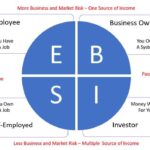Why do some people choose to take on great risks and start a small business rather than remain an employee that has a predictable and more secure income? This has been a vexing question that at some level I felt in my gut but had a hard time putting into words. As I pondered the answer to the question on a Saturday morning staring at a blank computer screen, two thoughts kept coming up. Believing in a noble purpose that is bigger than oneself and finding a way to intrinsically motivate stakeholders.
What is very interesting is that many corporations continue to use old industrial-era business management practices that have outlived their usefulness in the modern workplace. They lack a noble purpose that they can articulate to allow employees, customers, and investors to connect emotionally with the business. Moreover, they continually push in various ways to extrinsically motivate employees and customers to support the business and the brand rather than looking at ways to make them more intrinsically motivated to want to support the business and the brand.
Before the industrial revolution, workers in rural America operated lifestyle businesses, called micro businesses today, to support their families. Because these businesses were small and organized around family units, everyone was intrinsically motivated and would do anything to make the business succeed.
During the industrial revolution, workers were enticed to leave rural America, move to cities, and take factory jobs that principally involved manual labor. Since workers no longer had the intrinsic motivation of working in a lifestyle/micro business, employers used extrinsic motivations in the form of a carrot and stick approach to encourage workers to perform at their best. When it came to carrots, businesses offered incentives to employees in the form of commissions and bonuses to encourage them to make that extra effort. The stick was the loss of their job or income opportunities.
When it comes to extrinsically motivating a person, you must first create objective criteria to measure their performance. The objective criteria to measure one’s performance are most often arbitrarily defined milestones created by management. Employees and managers are then encouraged to hit or exceed the established milestones to receive the carrot or if they failed, they were subjected to the stick.
As a result, businesses focused on short-term wins that they could measure. To achieve their promised short-term goals, the corporation often resorted to accounting tricks such as layoffs, booking revenues across chronological boundaries, such as monthly, quarterly, or annual milestones to meet quotas, offering discounts to customers to buy this month instead of next month, or even to buy up smaller businesses just to claim their revenue, so that the numbers show that they have achieved the milestone arbitrarily set and defined by management.
The reason extrinsic motivations were so popular during the industrial era is that it is much easier to create objective yet arbitrary goals, and then measure performance against them than to try to measure a person’s commitment to a noble purpose or finding ways to intrinsically motivate them. It is much harder to measure subjective elements like motivation and feelings, yet these are the exact drivers that cause some people to leave a comfortable well-paying job to start a small business or cause customers to choose another brand. Motivation and feelings are emotions and as the saying goes “People make decisions based upon emotions and justify them with logic.”
I certainly do not want to come across as some kind of earth-shoes wearing hippie that’s more focused on how people feel than how they perform, but I do recognize the difference between being intrinsically motivated and extrinsically motivated and the value this has for a business.
I think that too much of the management narrative that is offered by many business advisors today has been reduced to making everything measurable. Some things just defy measurement. How do you measure a person’s commitment, their satisfaction with a product or their job, or their feeling of fulfillment? How do you create a scale to measure the love you have for your spouse or your children or for the company you work for? It is hard to place a number on feelings. Sure, you can try to quantify it.

Net Promoter Score or the pain scale above used in hospitals is an attempt to try to quantify a person’s feelings. But why do you have to measure feelings? Is it just a relic from the industrial era? Why not rally around a noble purpose and let gravity do the rest?
Results related to attempts to quantify feelings are subject to many variations. In the end, the answers you get trying to quantify a person’s feelings are at best relative and not absolute values.
The need to measure everything was acquired by entrepreneurs when working for big businesses and is stale and outdated and cannot be universally applied to today’s business environment.
At a fundamental level, business reasoning has evolved from causal to effectual reasoning as we moved from the industrial era to today’s knowledge era.
To be more precise, causal reasoning is the domain of large, capital-intensive businesses, such as innovation and manufacturing companies. Causal reasoning starts with a destination or goal in mind and backs up one step at a time to figure out all the steps that need to happen to effectively reach the stated goal. Causal reasoning focuses on an end state and what it takes to get there. Causal reasoning is predicated on the belief that “To the extent that we can predict the future, we can control it.” Causal reasoning essentially pushes people to a goal.
On the other hand, effectual reasoning is the domain of most infrastructure and local services businesses that dominate the small business community. With effectual reasoning, the business does not begin with a specific goal or target in mind. Instead, they focus on their assets, talents, and abilities and looks for ways to use them to solve a problem or support a cause. Essentially, they start with the means and not the goal. Effectual reasoning is predicated on the belief that: “To the extent that we can shape the future, we do not need to predict it.” Effectual reasoning, therefore, draws people into an orbit based on creating an intrinsic motivation to support a noble purpose.
Causal reasoning, therefore, has a defined path, and businesses measure the progress along the journey to make sure they are on track. Sometimes, new information along the journey may reveal a better goal but because people are focused on meeting arbitrarily defined milestones along the way, they continue along the same path and ignore any feedback from the journey. Effectual reasoning is more of a movement where the path is discovered during the journey. The journey is about a noble purpose and not a predefined destination.
Recently, I listened to a broadcast by SCORE, one of the volunteer organizations where I mentor startup entrepreneurs. As volunteers, we get no monetary compensation for our efforts. The value we get in return is 100% intrinsically motivated. By sharing our business knowledge with a client, we feel good about ourselves.
The more intrinsically motivated we are to help a budding small business succeed, the more effort we give to the organization. Some SCORE members are highly engaged while some are barely engaged at all.
SCORE’s real asset is the quality and motivation of its volunteers. Yet, the SCORE broadcast focused on chapter metrics such as most improved chapter, highest performing chapter in a region, best net promoter score, and so on. While this information may be what the national organization is obligated to provide to justify its annual budget to the Small Business Administration (SBA), it has no value in motivating the volunteer members or its clients.
As an organization with a charter to help small businesses, they rely on arbitrarily defined metrics to measure their performance. Nothing in the broadcast made me feel proud and motivated to give more, which is an indictment that SCORE is operated like every other large corporation, focused on vanity metrics to make senior leadership and the SBA feel like winners.
SCORE to its credit has a noble purpose and that is to help more people, especially people with limited financial resources and who lack business acumen and provide the tools to learn to become a successful entrepreneur. However, where SCORE fails is in understanding that emotions drive the behavior of its mentors and its clients and not some arbitrarily defined industrial era metrics that are out of touch with the values of its mentors and clients.
Still not convinced that today’s businesses need some type of noble purpose to intrinsically motivate customers and employees? Consider the fact that more and more workers, especially young ones, are avoiding working for large companies and the government because they do not feel like they are making a difference. Employees today want a job that has a purpose, a social cause where they can contribute to positive change and social impact. They desperately want to be intrinsically motivated. This is one of the primary reasons more and more people are embracing entrepreneurship.
As a former entrepreneurship director for a local community college, and when I’m lucky enough to talk to students interested in entrepreneurship, I can’t help but see that most of the business ideas they share with me are based upon some type of noble purpose they are emotionally connected to. Perhaps it is a business idea about how to have less food waste or how to make an industry eco-friendlier to save the planet.
Young people today want to know that, through their career and their buying habits, they are making a difference somehow. They crave to be associated with a noble purpose. Good luck trying to recruit a workforce or a millennial customer these days without having a clearly defined noble purpose they can relate to emotionally. If what your business does can’t be tied to what your workers or consumers see as making a difference, they will not care about your brand.
To be successful in business, employees and customers must have an emotional connection to the business. As a business owner, you must address their heart, not their head. My advice is to rely less on arbitrary metrics and milestones that provide the illusion of progress, and instead look for ways for employees, customers, and investors to be intrinsically motivated to work for you, buy your products or services, or invest in your business by sharing a noble purpose they can connect with emotionally.
How can you intrinsically motivate stakeholders with a noble purpose?












